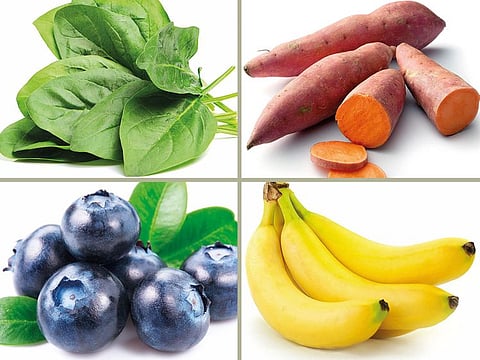Get your energy back for Eid by eating these foods
Balancing magnesium and potassium levels is key to keeping energy levels up

Dubai: If you’re feeling lethargic and your energy levels are running low in the last few days of Ramadan, you can turn it around before the Eid holidays by making simple changes to your diet.
The lack of sleep and poor food choices have been reported to be the main reasons of fatigue during Ramadan. With a small window to refuel, iftar and suhoor meals should be carefully prepared to meet daily nutritional needs.
Dr Fatemeh Aghanasiri, General Practitioner at Aster Clinic, explained that balancing your body’s magnesium and potassium levels is extremely important and directly linked to energy levels.
“Magnesium ions play an important role in over 300 biochemical reactions within the body including the metabolism of food, synthesis of fatty acids and proteins, and the transmission of nerve impulses,” she said.
They also play a vital role in the reactions that generate energy within the body, making magnesium-rich foods a must to keeping energy levels up during the fasting period.
Such foods include nuts like almonds and cashews, dates, flaxseed and green leafy vegetables.
“Potassium is also a key mineral that the body relies on heavily to function properly. Salmon, green leafy vegetables, pumpkin, lentils and sweet potato are a great source for potassium,” added Dr Aghanasiri.
Meanwhile, Dr Eman Abisourour, Consultant of Internal Medicine at Valiant Clinic, pointed out that if one’s diet is very poor when fasting, it can lead to the body’s depletion of important vitamins and nutrients, which can enhance the feeling of fatigue and lethargy. Dehydration is also very common during Ramadan as many people fall into the habit of reducing their water intake and consuming more caffeinated drinks.
With Eid around the corner, it is vital to regulate sleeping hours, food intake and energy levels during the last few days of Ramadan.
“It is important to ease the body back into its normal routine. Make sure you eat balanced meals, usually light ones to ensure you do not disrupt the stomach and digestive track,” said Dr Abisourour.
She also recommends increasing exercise sessions and hours of sleep per night closer to the Eid holidays. “People should try to go to bed relatively earlier so they can get enough rest and the body can enter the deep stages of sleep it requires to replenish itself with enough energy,” added Dr Abisourour.
Top 5 foods that provide the body with energy
— Salmon and fatty fish:
Salmon has a high content of omega-3 fatty acids, which can lower cholesterol and reduce your risk of heart disease. This type of fish is also a source protein, vitamin B6, niacin, and riboflavin / all of which help your body convert the food into energy.
— Sweet potatoes:
It is high in carbohydrates and loaded with Vitamin A (beta-carotene) and vitamin C. These vitamins usually help you fight midday fatigue
— Blue berries:
Blueberries are full of fibre, which enables the slow release of energy that will help you maintain your energy levels for hours.
— Bananas:
They are composed mostly of natural sugars (glucose, fructose, and sucrose) and fibre, and are a perfect source of energy. They can be consumed as snacks or as a breakfast substitute or add-on.
— Spinach:
This leafy green vegetable is a brilliant source of iron, which is a vital component for your body’s energy production. For people who struggle with after-lunch lethargy, this is the perfect food to eat at lunch in order to avoid afternoon sleepiness.
Source: Dr Eman Abisourour, Consultant of Internal Medicine at Valiant Clinic


